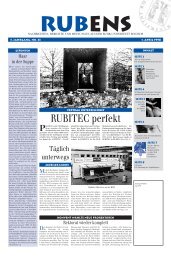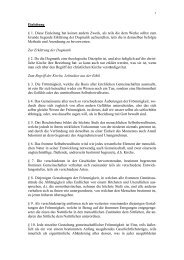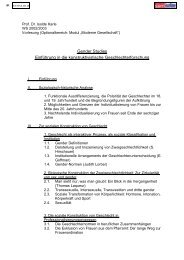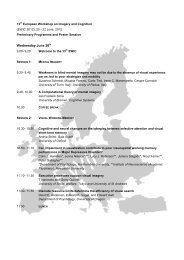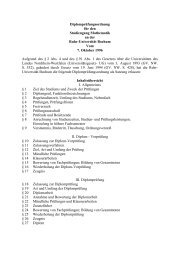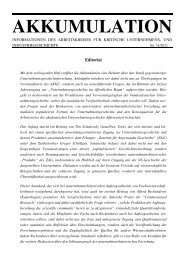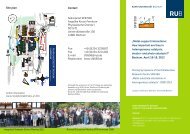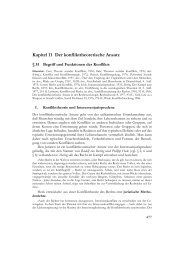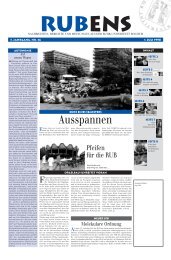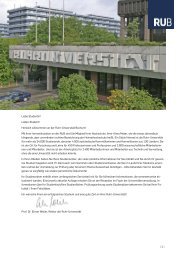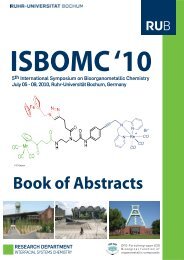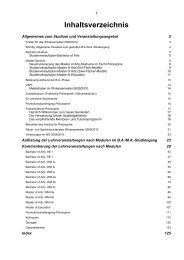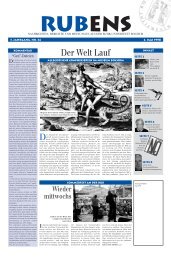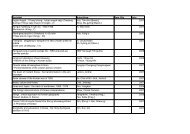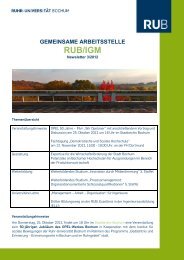Conclusion - Ruhr-Universität Bochum
Conclusion - Ruhr-Universität Bochum
Conclusion - Ruhr-Universität Bochum
You also want an ePaper? Increase the reach of your titles
YUMPU automatically turns print PDFs into web optimized ePapers that Google loves.
________________________________________________________________________________________<br />
The 2007 SYLFF Africa/Europe Regional Forum<br />
at the <strong>Ruhr</strong>-University <strong>Bochum</strong>, 25-27 June 2007<br />
Draft report on student presentations<br />
- days 1 and 3 -<br />
Background<br />
The Forum brought together an extremely diverse group of SYLFF students, scholars<br />
and practitioners from African, Middle East and European universities. Student<br />
presentations were held during the first and third days. This is a draft report based<br />
on rapporteur’s conclusions in the last day of the forum.<br />
Common themes<br />
The forum was held under the theme “Human Rights and Creative Leadership”.<br />
Participants examined a wide array of topics through various lenses: protection of<br />
individual and collective rights under diverse legal and political regimes,<br />
historiographic, theoretical and normative aspects of leadership in the context of<br />
human rights protection, case studies and theoretical approaches.<br />
Despite their variety, the presentations were bound together by a joint spirit of<br />
original research and, occasionally, interdisciplinarity. The spirit of fellowship was<br />
present throughout the individual presentations, the questions and answers<br />
sessions, and the informal discussions that ensued.<br />
An integrative theoretical framework was proposed by Prof. Löwenstein of the<br />
Institute of Development Policy and Development Research, focusing on the multidimensional<br />
concept of human security. A fundamental question was raised to the<br />
participants regarding the lack of creative leadership in the reality and theory of<br />
human security.<br />
1 | P age
________________________________________________________________________________________<br />
There was consensus amongst the participants that marrying the two themes of the<br />
forum – human rights and creative leadership – stimulated individual and collective<br />
search for “bridges”: conceptual and inter-personal.<br />
Specific issues<br />
Day 1 examined fundamental questions such as:<br />
o Current threats to our environment and related risks for human development:<br />
the concepts of population vulnerability and resilience, and the correlations<br />
between them were analysed in a practical perspective<br />
o Rights of women: the frameworks of social network theory and identity<br />
formation and transformation were used as references when discussing the<br />
factors that enable creative social action in human rights protection and<br />
promotion<br />
Day 3 addressed similarly complex issues:<br />
o Inter-societal relations between converging cultures: geopolitical<br />
determinants of identity changes were approached from a historiography<br />
and political economy angle, and stimulated a rich discussion. Two<br />
provocative conclusions emerged:<br />
o An over-supply of “creative leadership” on the part of a dominant<br />
partner (e.g. through the use of “democratic conditionality”) may<br />
create obstacles for the other partner’s internal reform processes,<br />
which in turn would spoil the chances of reformist parties on both sides<br />
o Globalization stimulates the formation of multiple identities which often<br />
challenge the consolidation of national democratic regimes,<br />
particularly in “borderline” regions or nations. The task of policy-makers<br />
and leaders in such countries thus needs to be analysed not only from<br />
a realpolitik perspective but also within the often unregulated fluxes of<br />
globalization (e.g. migration and “deterritorialisation”, issues which<br />
were briefly tackled within the proposed human security framework)<br />
o The nature of leadership: heated exchanges were sparked by a presentation<br />
on the possible factors explaining this dynamic area.<br />
We closed the presentations with a set of conclusions:<br />
o We need to place our research endevours within a holistic, human rights<br />
perspective<br />
2 | P age
________________________________________________________________________________________<br />
o We need to go beyond traditional, individual research, and work more<br />
through collaborative networks. SYLFF associations are important nodes in<br />
such multi-layered networks. We recognized that we could make a better<br />
use of information technologies in maintaining these virtual communities of<br />
practice.<br />
o Choosing the right level of analysis could greatly help in addressing global,<br />
highly complex issues<br />
o True leaders are those who give back more than they receive<br />
A bridge-building forum<br />
The presentations advanced a wealth of working hypotheses for further study,<br />
individually or through joint projects. Peer review and validation was appreciated,<br />
all the more given the informal, friendly spirit of the forum.<br />
We greatly benefited from a genuine heuristic spirit on the part of the presenters<br />
and contributors.<br />
We affirmed that the pragmatic application of the knowledge gained would keep<br />
this atmosphere alive, and reinforce the overall culture of sharing within the SYLFF<br />
network. Research was seen as an important factor in furthering human rightscentred<br />
agendas of social action.<br />
There was a clear recognition of the value-added of the forum in building bridges<br />
across regional and scientific frontiers.<br />
Diversity – of participants and presentations – created a unique opportunity for<br />
reflecting on the world around us through multiple perspectives. Excellent<br />
organization and facilitation greatly helped in forging a feeling of discovery and<br />
cross-disciplinary fertilization.<br />
But perhaps the main lesson was that it is our responsibility to become effective<br />
leaders in stimulating sustainable action and cooperation, both in research and<br />
applied projects.<br />
3 | P age



